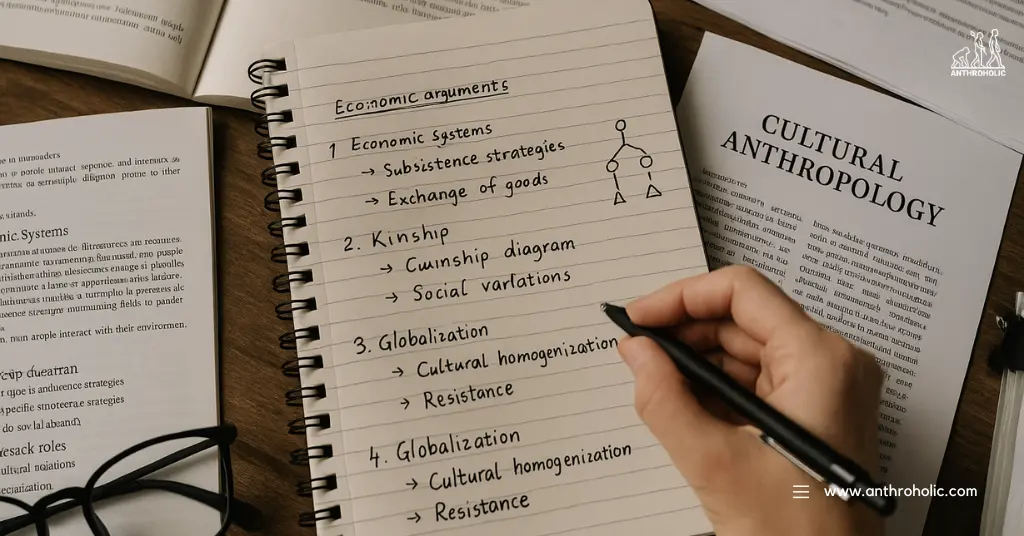AI Answer Evaluation Platform Live Now. Try Free Answer Evaluation Now
Structuring Arguments in Cultural Anthropology Papers
Writing a strong anthropology essay means more than listing customs or repeating theories. It calls for clear structure, sharp reasoning, and evidence that fits your claim. A solid paper links ideas naturally, guiding readers through your argument. When you master this skill, you explain complex anthropology topics with precision, clarity, and the confidence of real academic insight.

Crafting a Clear and Focused Thesis
Every good anthropology paper starts with a sharp thesis. It drives your analysis and gives your argument shape. In cultural anthropology, that thesis might explore rituals, kinship, or identity. But it must go beyond naming a topic — it must take a stand. Instead of writing “This essay discusses kinship in rural India,” try “Kinship networks in rural India reinforce hierarchy and enable cooperation.” The latter signals an argument, setting the tone for the entire discussion. To ensure clarity, refine your thesis as your research develops. Cultural anthropology often involves fieldwork, and new observations can reshape your ideas. Allow your argument to evolve but keep it consistent across the introduction, body, and conclusion.
Challenges in Organizing Complex Ideas
Students often feel lost when facing complex anthropology research topics. They must weave theory, field data, and comparison into one clear idea. Balancing these parts challenges, especially for beginners. When the structure becomes unclear, students can seek academic help and hire online paper writer at Edubirdie for guidance on organizing their arguments effectively. Expert feedback can clarify how to link theoretical frameworks with real-world data. Learning to connect concepts builds confidence in writing and reasoning.
Building the Framework: Introduction and Literature Review
The Introduction
Your introduction is supposed to introduce the research question, establish the context and establish your main argument. You can start by giving a brief description of the anthropology research topic you are dealing with and narrow it down to your specific claim. State the usefulness of your research – why it is important in the academic anthropological discipline. Conclude by having a definite thesis statement that will bring the reader into your analysis.
The Literature Review
Literature review situates your work among other scholars’ contributions. Summarize key debates, emphasis on theories, and gaps your paper will fill. This is not a bibliography list- it is a critical discussion. Use it to demonstrate how your argument contributes to or criticizes current research. When talking about past research, be moderate. Include both the traditional anthropologists, such as Clifford Geertz or Margaret Mead, and modern voices that add new understanding to your regions of interest in anthropology. This conjunction demonstrates profundity and the understanding of the development of the discipline.

Presenting and Structuring the Argument
The body of an anthropology essay needs to have a logical flow between the ideas. Break down your conversation into theme areas, each developing a part of your argument. As an example, in case you are writing on ritual and power, the body can be structured in the following way:
- Theoretical background. Discuss the anthropological theory you use as either symbolic interactionism or structuralism.
- Ethnographic evidence. Provide data in the field, in interviews, or case studies that demonstrate your arguments.
- Interpretation. Evaluate how the evidence works in favor of your thesis and how it relates to more general discussions in academic anthropology.
- Rebuts. Acknowledge other interpretations and tell us why your argument is still persuasive.
Every section must have a topic sentence which would be connected to the thesis. Do not use long and unstructured paragraphs. Avoid abrupt switches and make sure your analysis is flowing in the general theory to concrete evidence and not the other way round.
Balancing Theory and Empirical Data
Cultural anthropology thrives on the connection between theory and observation. A good paper achieves this equilibrium. Excess theory will lead to an abstract essay; excess description will lead to an anecdotal one. Combine them strategically. When you present a theoretical concept, one thing that you should do is to give an example of fieldwork or ethnographic research. For instance, when discussing kinship, you could apply Levi-Strauss’s structural theory to specific family systems observed in your research. This methodualizes abstract thought in real human experience – one of the important features of effective anthropological papers.
Writing a Compelling Conclusion
Your conclusion should not be a restatement of your introduction but should be a summary of your argument. Concisely, conclude on how your analysis has led to the answer of the research question and what it has added to the study of anthropology as a discipline. Identify how your findings can be applied to other topics of anthropology studies. Introducing new evidence is to be avoided here. Rather, consider the overall relevance of your argumentation how it enriches the knowledge of cultural processes or confronts already known interpretations. Conclude with a brief statement that leaves the readers with a critical thinking of your work.
Tips for Effective Argumentation
- Be constant: Have your thesis on every part.
- Apple authoritative sources: Back up arguments with peer reviewed research or established ethnographies.
- Be specific: Before using any significant anthropological terms, specify what they are.
- Make changes: Reread your paper to make sure the flow of your ideas is logical.
- Be critical: Be mindful of having many points of view, not one theory that you agree with.
These techniques will assist you in writing a cohesive and coherent paper on anthropology which is a demonstration of critical thinking and scholarly knowledge.
Conclusion
The arrangement of the arguments in cultural anthropology papers should be clear, logical and balanced between the theory and observation. It is through a well-structured thesis, incorporation of suitable literature, and consistent arguments that writers can transform complex cultural data into meaningful academic discussions. Regardless of the subject of exploration, belief systems, or social change, a structured approach will see every anthropology essay make a valuable contribution to the continuing discourse in academic anthropology.



